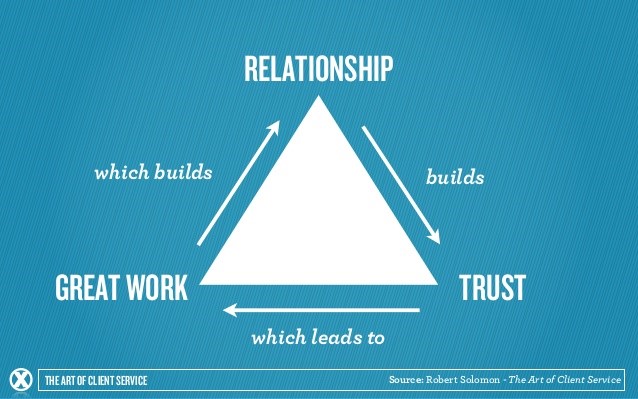
Diving head first into the intricacies of account management, a friend and marketing veteran recommended “The Art of Client Services” by Robert Solomon—an indispensable guide for anyone navigating the complexities of managing accounts. As I delved into the first few chapters, it became evident why this book is a must-read. The book is a treasure trove of soft-skill fundamentals and real-world examples, often overlooked or underappreciated.
Building The Triangle of Trust:
If the score is close between your shop and a competitor, how the client feels about you and your colleagues could very well be the tiebreaker.
At the heart of successful account management lies what Solomon calls the “triangle of trust,” with “relationships” as its keystone. Solomon presents numerous examples that showcase how a contract was won, a problem solved, or the tide turned simply because the client had a strong relationship with the agency. Equally important, he emphasizes the significance of fostering internal relationships within the agency: “Express respect for the work and the people who made it … [your] job [is] to improve the work, not approve it”. Collaboration, as Solomon suggests, is the driving force behind all successful relationships, leading to trust, and ultimately creating an environment where exceptional work thrives.

Mastering Soft Skills:
It’s more about skills and qualities than about education and experience…tending bar will teach you more than working in a company that has no clue about collaboration or client service.
Solomon underscores the pivotal role soft skills play in account management. He aptly notes that success in this domain is more about skills and qualities than education or experience. Touting the value of experiences like tending bar, he emphasizes the delicate balance account managers must maintain between accommodating clients’ needs while not hastily agreeing to everything. It is an art, a social tight-rope act that demands finesse and tact.
Crafting a Solid Strategy:
The brief will guide creative development [and] serves as a yardstick by which to measure the concepts that emerge from it.
While relationships are vital, Solomon reminds us that account management involves much more. He highlights an often-overlooked aspect—the strategic side of the job. Clear and concise strategy is the foundation on which successful campaigns are built. Solomon firmly believes that getting the strategy right is crucial for achieving effective advertising. He generously shares insights to help avoid common pitfalls in developing proposals, briefs, budgets, and more. The strategy serves as a constitution, governing each project. After all, “If the strategy is wrong, there is little hope of getting the advertising right,” notes Solomon.
Integrity and Judgement:
When it comes to qualities, there are two that stand above all others: integrity and judgment.
Two qualities, according to Solomon, stand above all others: integrity and judgment. Taking inspiration from his experiences, he emphasizes the importance of addressing problems head-on, taking ownership, and being accountable. Mistakes are inevitable, but owning up to them and working transparently with clients is crucial. Solomon’s sage advice reminds us that “while advertising is of great importance to clients, it is not a life-or-death matter”.
Conclusion:
“The Art of Client Services” is more than just a book; it is an essential guide for navigating the challenging world of account management. From nurturing relationships and mastering soft skills to crafting solid strategies and upholding integrity, Robert Solomon provides invaluable insights that will undoubtedly shape the way we approach client services. Aspiring and seasoned account managers alike will find in this book a wealth of knowledge to enhance their skills and thrive in the ever-evolving landscape of client services.
Saving For Later:
Even with seemingly simple requests, a unilateral yes is not the right answer. It does a terrible disservice to everyone – your colleagues, yourself, and most of all, your client.
Encourage your clients to set goals that are in line with reality.
Personal agendas…can undermine your ability to create the best possible advertising.
The two fatal mistakes an account person can make are to become either the client’s ‘man’ at the agency–or the agency’s ‘man’ at the client. Both fail. A good account person gives us objectivity, commitment, insight, and–above all–truth.
Respect your colleagues’ time, which allows you to ask for the same in return…creating an agenda in advance helps you determine if you actually need a meeting, or if a phone call or an email will do.
Once you have buy-in, it’s time to move on.
If anything is unclear, your job is to make sure it becomes clear…
If you are unable to clearly define the work to be done, build contingency dollars into your fee estimate to deal with the unexpected…price according to the degree of uncertainty.
Creative work is anything but linear
Get creatives in the room with you and figure it out together.
Developing the strategy is a team sport…